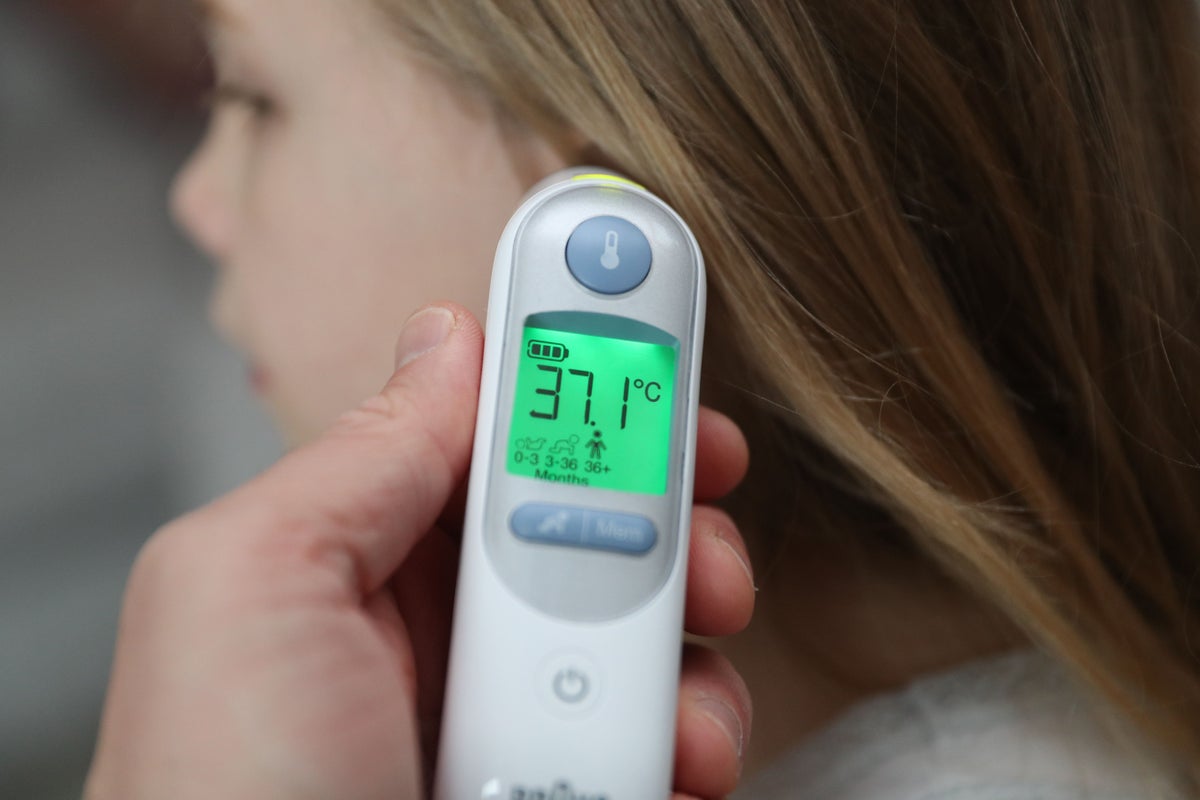
At least 19 children have died with an invasive form of Strep A in recent weeks, while cases of scarlet fever, which is caused by the bacterial infection, have soared.
The bacteria, Streptococcus pyogenes, can linger in the throat and on the skin and cause many different illnesses if transmitted through sneezing or physical contact, including impetigo, scarlet fever and strep throat.
While the vast majority of infections prove relatively mild, the bacteria can also sometimes cause a life-threatening illness known as invasive Group A Streptococcal (iGAS) disease.
Symptoms include high fever, severe muscle aches, localised muscle tenderness and redness at the site of a wound.
The latest data from the UK Health Security Agency (UKHSA), released on Thursday, showed that the number of life-threatening infections caused by the bacterium had risen by 27 per cent in the previous week, amid a three-fold rise in scarlet fever cases for the time of year.
Professor Susan Hopkins, chief medical adviser at the UKHSA, told BBC Radio 4’s Today programme: “The latest with scarlet fever and Strep A infections is that we’ve seen just over 7,500 notifications of scarlet fever, and that’s probably an underestimate. We have a lot of reports coming in in the last few days, so we expect it to be even higher.
“That’s about three times higher than the same time in a normal season. The last bad season we had was in 2017 and 18.
“And in invasive Group A Strep cases, we are more than halfway through what we’d normally see in an average season. We’ve seen 111 cases in children aged one to four, and 74 cases in children aged five to nine.”

Parents have been urged by schools to be on the lookout for symptoms including persistent fever, cellulitis and arthritis and warned that children who have previously had chickenpox or flu could be more vulnerable to the infection than others.
Families with concerns have been advised to contact their GP or call NHS 111 if their child falls ill or feels unwell, to keep them off school until they are better, to practise good hand hygiene and use tissues to shield coughs and colds.
There is no vaccine to guard against Strep A or scarlet fever, although in the former case, several have reportedly been through early-stage clinical trials and research into the matter has been ongoing since the 1940s.
Also speaking on Radio 4’s Today programme, Professor Adam Finn, of the University of Bristol, said Strep A had been neglected in terms of vaccine development.
“We don’t see so much of it as we did historically [but] it’s something that we do see quite frequently in little bursts as the years go by,” he said.
“There is a desperate need to make a vaccine against this bug. It’s a very neglected bug, it causes a lot of problems, the most notable of which is rheumatic fever, which is a problem in many children in poor countries.”
Antibiotics are usually the first line of defence against Strep A infections, and despite early pushback from the government over fears the UK was facing a supply issue, the Department for Health and Social Care (DHSC) this week issued two waves of emergency rule changes to help alleviate pressure on pharmacies with limited stocks.
The new Serious Shortage Protocols (SSPs) are intended to help mitigate the local supply issues affecting medicine stocks, and will allow pharmacists to supply alternative forms of the medicine from that stated on the prescription.
In a statement, the DHSC said: “Demand for penicillin has risen recently as it is used to treat Strep A and scarlet fever, and the increased demand means that some pharmacists are experiencing temporary and localised supply issues and may not have the specific formulation listed on the prescription.”
SSPs are intended to help mitigate the local supply issues affecting stocks of oral penicillin, and will allow pharmacists to supply alternative forms of the medicine from that stated on the prescription.
You can find out more about Strep A on the UKHSA blog and about scarlet fever on the NHS website.
WHAT PARENTS HAVE BEEN ADVISED TO DO IF A CHILD IS UNWELL
Advice from UK Health Security Agency on Strep A:
The first signs of scarlet fever can be flu-like symptoms, including a high temperature, a sore throat, and swollen neck glands (a large lump on the side of your neck).
A rash appears 12 to 48 hours later. It looks like small, raised bumps and starts on the chest and tummy, then spreads. The rash makes your skin feel rough, like sandpaper. The rash will be less visible on darker skin but will still feel like sandpaper.
Contact NHS 111 or your GP if:
- your child is getting worse
- your child is feeding or eating much less than normal
- your child has had a dry nappy for 12 hours or more, or shows other signs of dehydration
- your baby is under 3 months and has a temperature of 38C, or is older than 3 months and has a temperature of 39C or higher
- your baby feels hotter than usual when you touch their back or chest, or feels sweaty
- your child is very tired or irritable
Call 999 or go to A&E if:
- your child is having difficulty breathing – you may notice grunting noises or their tummy sucking under their ribs
- there are pauses when your child breathes
- your child’s skin, tongue or lips are blue
- your child is floppy and will not wake up or stay awake







